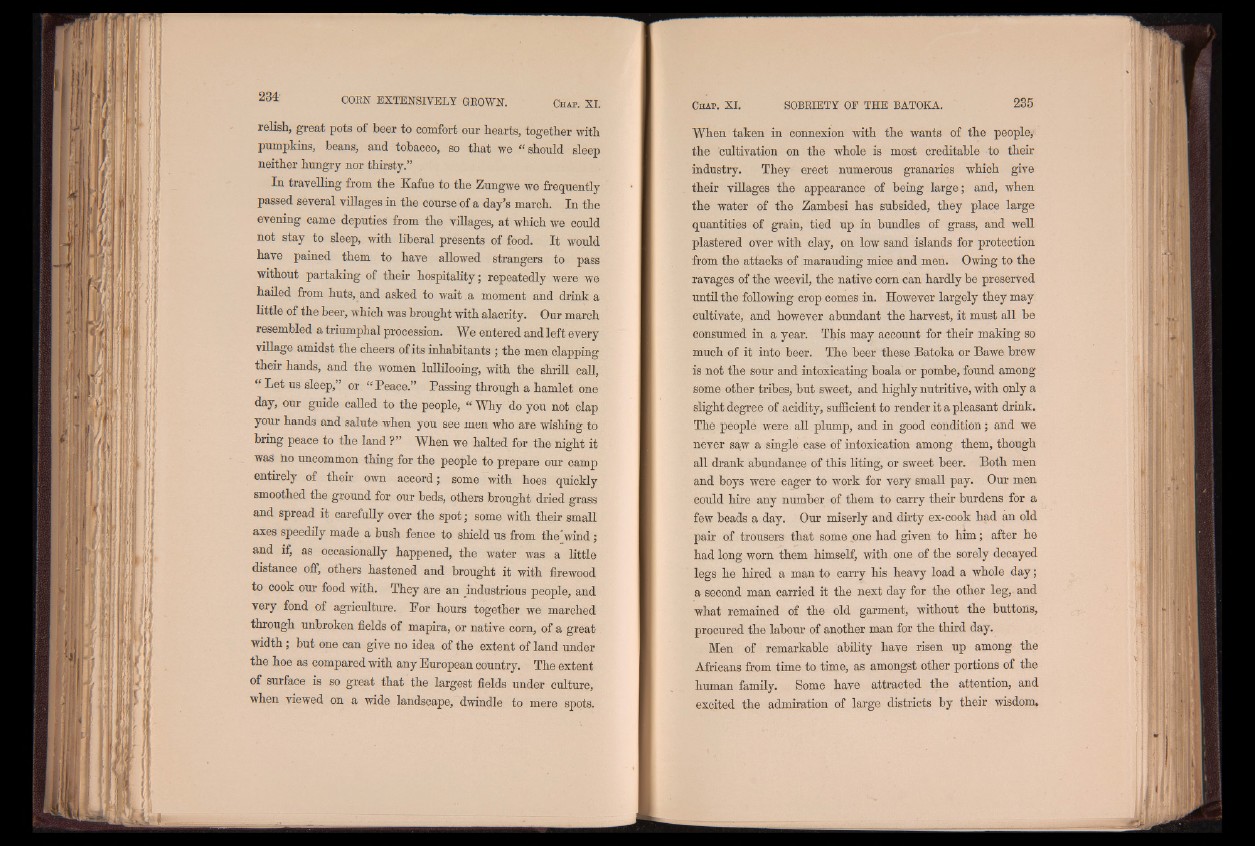
relish, great pots of beer to comfort our hearts, together with
pumpkins, beans, and tobacco, so that we “ should sleep
neither hungry nor thirsty.”
In travelling from the Kafue to the Zungwe we frequently
passed several villages in the course of a day’s march. In the
evening came deputies from the villages, at which we could
not stay to sleep, with liberal presents of food. I t would
have pained them to have allowed strangers to pass
without partaking of their hospitality; repeatedly were we
hailed from huts, and asked to wait ,a moment and drink a
little of the beer, which was brought with alacrity. Our march
resembled a triumphal procession. We entered and left every
village amidst the cheers of its inhabitants ; the men clapping
their hands, and the women lullilooing, with the shrill call,
“ Let us sleep,” or “ Peace.” Passing through a hamlet one
day, our guide called to the people, “ Why do you not clap
your hands and salute when you see men who are wishing to
bring peace to the land ?” When we halted for the night it
was no uncommon thing for the people to prepare our camp
entirely of their own accord; some with hoes quickly
smoothed the ground for our beds, others brought dried grass
and spread it carefully over the spot; some with their small
axes speedily made a bush fence to shield us from the wind;
and if, as occasionally happened, the water was a little
distance off, others hastened and brought it with firewood
to cook our food with. They are an industrious people, and
very fond of agriculture. Por hours together we marched
through unbroken fields of mapira, or native com, of a great
width; but one can give no idea of the extent of land under
the hoe as compared with any European country. The extent
of surface is so great that the largest fields under culture,
when viewed on a wide landscape, dwindle to mere spots.
When taken in connexion with the wants of the people*«
the cultivation on the whole is most creditable to their
industry. They erect numerous granaries which give
their villages the appearance of being large; and, when
the water of the Zambesi has subsided, they place large
quantities of grain, tied up in bundles of grass, and well
plastered over with clay, on low sand islands for protection
from the attacks of marauding mice and men. Owing to the
ravages of the weevil, the native corn can hardly be preserved
until the following crop comes in. However largely they may
cultivate, and however abundant the harvest, it must all be
consumed in a year. This may account for their making so
much of it into beer. The beer these Batoka or Bawe brew
is not the sour and intoxicating boala or pombe, found among
some other tribes, but sweet, and highly nutritive, with only a
slight degree of acidity, sufficient to render it a pleasant drink.
The people were all plump, and in good condition; and we
never sa,w a single case of intoxication among them, though
all drank abundance of this liting, or sweet beer. Both men
and boys were eager to work for very small pay. Our men
could hire any number of them to carry their burdens for a
few beads a day. Our miserly and dirty ex-cook had an old
pair of trousers that some one had given to him; after he
had long worn them himself, with one of the sorely decayed
legs he hired a man to carry his heavy load a whole day;
a second man carried it the next day for the other leg, and
what remained of the old garment, without the buttons,
procured the labour of another man for the third day.
Men of remarkable ability have risen up among the
Africans from time to time, as amongst other portions of the
human family. Some have attracted the attention, and
excited the admiration of large districts by their wisdom.